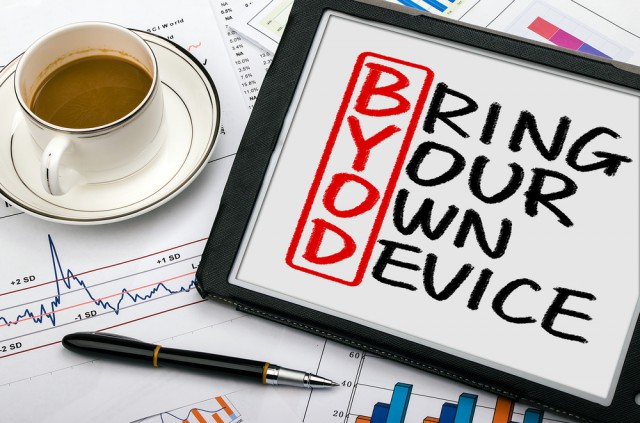
Bring Your Own Device can empower your employees, and increase productivity too
Companies have been more trusting of their employees since the pandemic forced everyone to work at home. In much the same way that employers realized their staff could be trusted to get on with the job despite being unsupervised, they are also realizing that they can trust them to use their phone for work without opening Candy Crush.
Technology is encouraging employee autonomy and the advantages of convenience, efficiency and productivity are being recognized by forward-thinking businesses.

Poor security practices still a challenge for hybrid work
Almost a third (29 percent) of workers still use the same passwords for both personal and work accounts, potentially compromising their organisation if a personal account gets hacked.
A new study of 2,000 UK adults carried out by OnePoll for professional services company Gemserv also shows 39 percent of respondents access corporate accounts and content from their personal devices often or always, with another 24 percent doing so sometimes.

Personal devices could pose a risk as workers go back to the office
New research shows that 61 percent of employees intend to bring their personal devices into the office as they return to more conventional working patterns.
A study of 2,000 UK employees, conducted by Censuswide on behalf of asset visibility and security platform provider Armis, shows 61 percent of employees use their personal mobile phone and 44 percent use their own laptop for business purposes.

Security not keeping pace with moving to BYOD
With a shift to remote working many more businesses are embracing BYOD, but a new report from Bitglass suggests that security arrangements are failing to keep pace.
In the study, 69 percent of respondents say that employees at their companies are allowed to use personal devices to perform their work, while 26 percent also enable BYOD for contractors, 21 percent for partners, and some even for customers, and suppliers.

Secure BYOD, the BYOD way
Bring your own device (whereby employees work from personal devices like their mobile phones) is quickly becoming the norm in today’s business environment. Companies that embrace BYOD are able to give employees more freedom to work remotely, resulting in increased productivity, cost savings and talent retention. In fact, 85 percent of organizations now allow BYOD for at least some of their stakeholders, including employees, contractors, partners, customers and suppliers.
It is important to note that BYOD does change an organization’s threat landscape and requires security tools that are different than those that are used to protect managed devices. Unfortunately, a widespread misunderstanding about this point has contributed to an unfounded assumption that BYOD is inherently riskier than the traditional way of doing things. In reality, this is a myth fueled by companies that fail to implement proper security tools and processes for protecting data in BYOD environments. Consider the following findings from a recent report on BYOD and security:

85 percent of companies permit BYOD but security remains a concern
While a large majority of companies now permit employees to use their own devices for work, they have concerns over security and privacy.
Organizations are making BYOD available to employees (76 percent), contractors (27 percent), partners (25 percent), customers (22 percent), and suppliers (19 percent).

Personal devices are a major threat to mobile IT environments
A new survey finds that 58 percent of respondents believe access to their network from non-corporate and personally owned devices such as laptops, desktops or mobile phones is the highest risk in managing remote users.
The study from trusted access specialist Duo Security shows that while the trend to remote working has created unmatched flexibility and helped organizations attract top talent globally, it has also introduced a major predicament for IT and security teams.

Shadow devices put enterprise networks at risk
A new study finds that enterprise networks have thousands of shadow personal devices including laptops, tablets and mobile phones, as well as Internet of Things devices -- such as digital assistants and smart kitchen appliances -- connecting to them.
The report from network control company Infoblox shows 35 percent of companies in the US, UK and Germany reported more than 5,000 personal devices connecting to the network each day.

Cylance brings enterprise-grade security to employees' homes
Businesses go to great lengths to protect their corporate networks, but when staff take work home it can be hard to ensure data is kept secure when using personal devices and accessing data from the cloud.
In an innovative move, endpoint protection company Cylance is offering employees of companies that use its software the chance to use Cylance's enterprise-grade AI-powered endpoint prevention to protect their family's home PCs and Macs against malicious attackers.

One in four organizations use only passwords to secure BYOD
Allowing employees to access corporate data via their own devices is increasingly popular, but it does present risks if not implemented correctly.
A new report from data protection company Bitglass finds one in four organizations do not have multi-factor authentication methods in place to secure BYOD -- a well-known enterprise security gap.

New technology platform helps secure business devices
Thanks to increased use of mobile and BYOD devices, there's a significant risk to business networks from un-managed and uncontrolled devices which could offer a route for security breaches.
Israeli startup company Axonius is looking to solve this problem with a new platform designed to eliminate blind spots on the network and provide a single place to understand, manage and control the security of all end user, compute and IoT devices.

Growth of BYOD proves it's no longer an optional strategy
If you study graphs related to the adoption rate of BYOD and BYOD spending, you’ll notice that it’s pretty steep. While growth may have been gradual from 2010 through 2014, adoption rates have skyrocketed over the last couple of years.
Enterprises and small businesses alike are finally realizing that BYOD is no longer an optional strategy if they want to remain competitive.

Managing BYOD: Best practices
BYOD is dying. It’s not that people no longer bring devices to work. It’s that everyone brings their devices to work. Whether you use BYOx (bring your own everything) to describe this phenomenon or some other term, there are important concerns to be addressed.
For example, will you be providing devices to all employees, some employees (e.g., managers and executives) or no employees? How will user-owned devices connect to the network and how do you ensure personal and corporate data separation? What about company-owned devices and who owns, and thus has free access to, the data stored on them? And what happens when a device with company data or the ability to connect to the company network is stolen?

Most employees use smartphones for private tasks during work hours
Smartphones, even personal ones, are no strangers to the workplace. With the increase in adoption of BYOD initiatives, more and more employees are using their smartphones for everyday job tasks.
However, according to a new report by LaptopsDirect.co.uk, British workers are also using personal smartphones for private communication, during work hours, as well.

Employees who embrace BYOD feel judged
There is a strange side-effect to the Bring Your Own Device initiative, and one that's slowing it down. Apparently, many employees refrain from bringing their own devices to work for the fear of being judged.
No, not because their devices are old or slow, but because others will think they're using them for personal instead of professional reasons.
